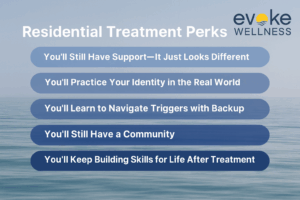If you’ve just completed a residential treatment program, you’ve already done something many people never do—you’ve stopped long enough to heal. You’ve lived in a space with walls that protected you, with schedules that carried you, and with people who spoke your language.
Now comes the next chapter: a Partial Hospitalization Program (PHP). On paper, it’s the “step down” from residential care. But if you’re honest, it might feel more like a free fall.
You might be wondering:
- Will I lose my footing without the 24/7 support?
- Will I still feel like me in the outside world?
- Will my creativity, humor, or edge fade with my old habits?
The truth? PHP isn’t the end of your safety—it’s the start of your freedom. It’s where you take what you’ve learned in residential and try it out in a bigger space, with people ready to catch you if you stumble.
You’ll Still Have Support—It Just Looks Different
In residential treatment, your world was a bubble. Every meal, meeting, and movement was planned. That structure was there to hold you while you rebuilt.
PHP opens that bubble just enough to let life in—without letting it crash over you. You’ll spend your days in structured therapy, groups, and skill sessions, then return home or to sober housing at night.
Think of it like switching from a full harness to a safety belt. You’re still supported—you just have more freedom to move.
Mini-story:
Chris, a 32-year-old musician, described it like this:
“In residential, I felt like I was in the studio—safe, controlled, able to focus on the sound. PHP was like stepping on stage for the first time again. It was still my music, just with a live audience.”
You’ll Practice Your Identity in the Real World
One of the biggest fears people have in early recovery is losing themselves. If I’m not the person who drinks, uses, or parties—who am I?
PHP gives you the chance to find out. You’ll have hours each evening to live your life outside the program. You might cook dinner, hang with family, walk your dog, or pick up your guitar. The difference is, you’ll do it without leaning on substances.
And here’s the surprise for most people: your identity doesn’t disappear. It becomes clearer. You start to realize you were never just “the funny drunk” or “the life of the party.” You’re still you—only steadier.
You’ll Learn to Navigate Triggers with Backup
Residential treatment is like a rehearsal room. PHP is the first performance. You’ll still be practicing the same skills—mindfulness, coping strategies, communication—but now you’re trying them out in the real world.
If you run into a trigger—like seeing an old friend who still uses or feeling the pull of an old neighborhood—you can bring it to your PHP group the very next day. You’ll break it down with your therapist and peers, get feedback, and plan how to handle it next time.
This loop—real-world experience followed by immediate support—is what makes PHP so powerful.
You’ll Still Have a Community
The friendships and connections you made in residential treatment don’t disappear when you step down. Many clients stay in touch, visit, or even attend overlapping PHP groups with the same people.
In PHP, you’ll also meet new peers who are at different stages of recovery. That mix can be inspiring—you’ll see people who are just starting their journey and others who are already moving toward outpatient care or independent living.
Mini-story:
Sofia, 27, shared:
“I thought I’d feel alone after leaving residential, but in PHP I met people who reminded me of myself two months ago—and others who gave me a glimpse of where I could be in six months. It kept me moving forward.”
You’ll Keep Building Skills for Life After Treatment
PHP isn’t just about not using. It’s about living well enough that you don’t want to use.
You’ll continue learning practical skills like:
- Managing your schedule without burning out
- Cooking healthy meals (on a budget)
- Setting boundaries without guilt
- Handling conflict without blowing up or shutting down
These aren’t “bonus” lessons—they’re the core of what makes long-term recovery possible.
What to Watch Out for During This Transition
Even with the support of PHP, the shift from residential can feel jarring. You may notice:
- More exposure to temptation
- Fatigue from balancing treatment with outside life
- Old coping patterns trying to sneak back in
This doesn’t mean you’re doing it wrong—it means you’re human. The key is to resist the urge to go it alone. Recovery isn’t a solo sport.
FAQs About Moving from Residential Treatment to PHP
1. How many hours a week is PHP?
Most PHP programs run 5–6 hours a day, 5 days a week. The exact schedule depends on your needs and treatment plan.
2. Will I still see my therapist from residential?
Sometimes, yes—but often you’ll work with a new team trained specifically for this phase. They’ll communicate with your residential team so nothing gets lost.
3. Do I need sober housing to attend PHP?
Not always. Some clients live at home, while others choose sober living for extra accountability.
4. Is PHP covered by insurance?
Many insurance plans cover PHP. Our admissions team can help you confirm your coverage before you start.
5. What if I relapse in PHP?
Relapse is not the end—it’s feedback. PHP is a safe space to address it quickly and adjust your plan before it becomes a spiral.
6. How long will I be in PHP?
It varies. Some people stay a few weeks, others several months. Your progress and stability will guide the timeline.
7. Will PHP prepare me for full independence?
Yes. The goal is to step down to outpatient care—or no formal care at all—feeling confident in your skills and supports.
8. What if I feel like I’m losing my creativity?
Sobriety often enhances creativity. Without the fog of substances, you’ll have more energy and clarity to channel into your work. PHP helps you nurture that.
9. Can I work or go to school during PHP?
Sometimes. It depends on your schedule and progress. Many choose to focus solely on treatment first, then add work or school gradually.
10. Will people outside treatment understand what I’m doing?
Not always—and that’s okay. PHP is about building the confidence to live your recovery regardless of others’ opinions.
Your Next Chapter Starts Here
Completing a residential treatment program isn’t the end of the story—it’s the moment you start testing the life you’ve been building. PHP lets you step into that life with support close by, so you can see for yourself that sobriety doesn’t erase who you are—it lets you show up fully as yourself.
Call (866)430-9267 or visit our residential treatment program services in Hilliard, Ohio to find out how we can help you move confidently into your next phase of recovery.



